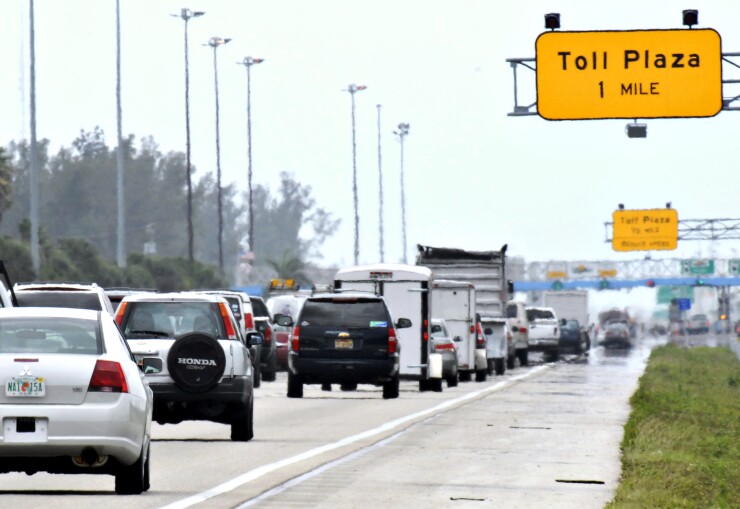A second rating agency is warning Florida lawmakers about the negative consequences that may befall the Miami-Dade County Expressway Authority if legislation usurping the agency’s decision-making power becomes law.
Moody's Investors Service said Thursday that it considers the current political dispute affecting the expressway authority’s operations as a negative pressure on the credit.

“Any changes that reduce the authority's ability to adjust rates to meet bond debt service, operating expenses, and other liabilities would be negative to the authority's credit profile,” said analyst Myra Shankin.
Moody's rates the authority's $1.53 billion of outstanding revenue bonds A1.
House Bill 385, which passed the House by a vote of 80-33 on April 17, would dissolve the authority, create a new agency and require it to consider toll rebates as high as 25%. The measure would also put restrictions on future toll increases and bond issuance.
HB 385 has been sent to the Senate for consideration and while that chamber’s Senate Bill 898 remains in play, both bills have similar language and make some requirements subject to compliance with bond covenants.
Opponents of the bills say they would illegally usurp the authority’s ability to operate freely in accordance with its ownership of five local expressways, which were purchased in 1966 in a transfer agreement with the Florida Department of Transportation.
“The greatest credit risk, if any change of control occurs, would be the impact to the authority’s ability to raise tolls,” Shankin said. “Any restrictions on the facility's ability to raise revenue to meet the authority's commitments would have a negative credit impact and could result in a rating downgrade, potentially greater than one notch.”
On April 17, Fitch Ratings placed its A rating of the authority’s debt on rating watch negative and warned that if one of the bills become law as proposed the successor agency would have “substantially altered” financial flexibility and rate-setting autonomy that could result in up to a two-notch downgrade.
Fitch first put a negative outlook on the authority’s bonds in July 2018, the second year lawmakers passed a bill ordering toll reductions and surplus revenues to be diverted to fund transportation projects unrelated to the expressway authority.
S&P Global Ratings rates the authority A-plus.
The authority, also known as MDX, has already filed a lawsuit against the state challenging the legality of the 2017 and 2018 bills.
Javier Rodriguez, the authority’s executive director, said in a statement to The Bond Buyer Friday that the pending suit was filed because the agency believes the prior bills are an unconstitutional impairment of the authority’s transfer agreement.
“Pursuant to MDX’s amended and restated trust indenture, the contract delineating MDX’s obligations to its bondholders, MDX is contractually required to diligently enforce the terms of the transfer agreement,” Rodriguez said.
He added, “MDX is similarly contractually required to seek judicial review and injunctive relief for any statutes that pass this legislative session that similarly violate the MDX transfer agreement or any other contract to which the authority is obligated in order to be in compliance with its obligations to its bondholders.”
Moody’s also questioned whether the state can take the assets of a locally created authority that purchased them pursuant to a contract, and said the current legislation increases risks for MDX bondholders.
Moody’s said it believes that the dispute with state lawmakers first arose in 2014 when MDX completed its shift to all electronic tolling and increased rates on the Airport Expressway or State Road 112 and the Dolphin Expressway, SR 836, both of which are used by local commuters.
“Prior to that, the locations of cash toll plazas allowed some motorists to strategically travel on segments without paying tolls,” Moody’s said. “Combined with the elimination of free westbound traffic, there was a vocal adverse reaction to MDX’s new tolling plan and several legislative proposals have been made in the years since.”
If the legislation proposed this year doesn’t pass, Moody’s said similar bills are expected to be filed in the future and it’s probable that the courts will have to definitively settle the ownership issue.
The legislative session ends May 3.





